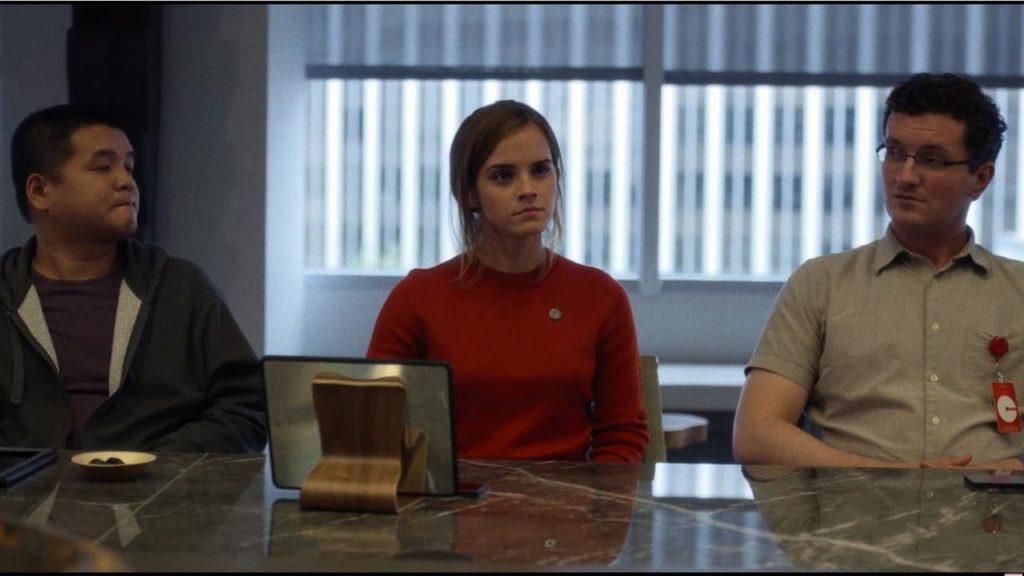DATEWORTHY?: MAYBE. “The Circle” raises some interesting questions about where society is headed in the image-obsessed age of selfies and ever-shrinking privacy, but contradictory characters and some lapses in logic hinder it somewhat. Overall, it might spark conversation in people who are really into tech or privacy issues, but this might be a good movie to skip and save your money for the far more fun “Guardians of the Galaxy Vol. 2” next week.
We live in a self-obsessed, media-driven age, one in which many people seem to constantly take selfie images of themselves and post them all over the Internet in a bid for attention from friends, family, colleagues, and — let’s face it — just about anyone who cares to look. But how far will this behavior go in the years to come, and will the masses ever stop to think about how much privacy they’re giving up to Web-based companies like Facebook and Instagram while mindlessly pursuing attention?
The new movie “The Circle” explores these questions, and one might hope that given its stars are Tom Hanks and “Beauty and the Beast” favorite Emma Watson, it would make for a compelling and thrilling ride. But unfortunately, its often lazy pacing and muddled message limit its effectiveness and might even bore some viewers into checking their text messages and social-media accounts while watching the film.
The movie stars Watson as Mae, a seemingly average young woman stuck in a dead-end temping job at a water company, calling people to get them to pay their bills, when a friend calls to tell her she has a job interview at The Circle, a Facebook-style company in San Francisco. Excited for the opportunity, she passes an interview filled with strange questions designed to test character and provide insights into her thought process.
While the job seems like another pointless customer-service phone position, Mae is impressed by the numerous perks offered to its employees, including free food, all sorts of exercise programs and games, and other expensive amenities. Her parents, who are poor and dealing with her father’s worsening multiple sclerosis, are proud of Mae but as she is drawn ever further into the company’s insular, all-consuming culture, they start to worry.
The company’s cult-like atmosphere is pushed by its founder, a man named Bailey played by Tom Hanks, and his main associate Stenton, played by Patton Oswalt. Bailey is a Steve Jobs-like figure who spends most of his onscreen time making grand speeches to his giant staff about his new tiny cameras that can be placed anywhere to provide imagery of just about everything imaginable.
Eamon claims that his intentions are pure, to just provide people with an extended window on the world that can even be used for good, including the ability to track down previously unfindable criminals anywhere in the world within minutes. When a senator tries to investigate the company over privacy issues, the senator is suddenly caught in a scandal which negates the investigation, and another senator comes forward to say they will be willing to have every single conversation and email they engage in be seen by the public in real time – with the idea that transparency is the key to a good democracy.
Mae is soon caught up in this mindset, particularly when the company doctor tricks her into swallowing a sensor that will track all of her biological measures including her heart rate on a constant basis. When she’s briefly concerned about this, the company quickly offers to care for her parents, who are going broke due to her father’s multiple sclerosis.
Blinded by this seeming generosity, Mae volunteers to be the first regular citizen in the world to allow herself to be filmed at all times, with only three-minute bathroom breaks going unseen. But as millions trace her every move, she is warned by a key disillusioned member of the company (John Boyega) and a former boyfriend (Ellar Coltrane) that there are nefarious motives and consequences to the company’s plans, and Mae suddenly has serious decisions to make.
This may sound intriguing on paper, and “The Circle” raises some important questions about how far companies should be allowed to extend their influence on society and about how far people are willing to let their privacy be encroached upon in our over-saturated media age. But director James Ponsoldt’s pacing is strangely flat throughout, limiting the amount of thrills that one might expect from the concept, and Mae has too many contradictions— one moment, she’s skeptical about the cameras, the next she’s a self-obsessed media star, another moment she feels that the technology is noble and then evil again, with an ending that makes no sense in relation to the rest of the movie.
The film rests on Emma Watson’s shoulders, but her character’s contradictions make her so annoying to deal with that Watson can’t make her someone to root for for long. Hanks is mostly seen delivering his onstage speeches, with a couple of brief scenes in his office that are meant to be subtly sinister but never really generate much spark.
Overall, “The Circle” winds up taking the position that while it might be good to question technology once in a while, tech advances can’t be stopped and so everyone might as well give in. It’s a lazy and disappointing conclusion, and since it’s so contradictory to the direction most of the movie is heading towards, it’s also one that impacts the quality of the movie overall.
“The Circle” is rated PG-13, but has very limited foul language with one F word and about seven S words, an extremely brief and unclear sex scene with Mae’s married parents caught on a camera by surprise, and violence limited to a truck chase that ends tragically.



